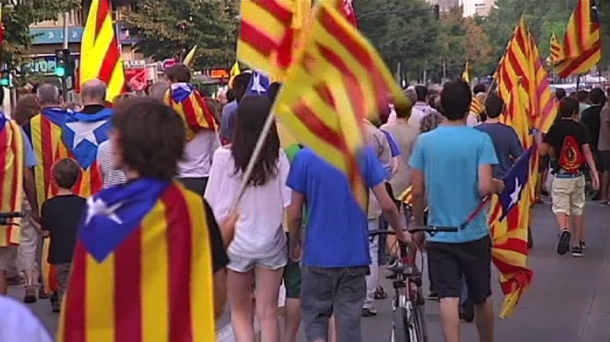Politics
Diada
Catalonia celebrates national day amid strong desire for independence
Reuters TV
Barcelona
Regionalist feelings have existed for centuries but have been strengthened because of the crisis. Many Catalans believe their economic position would be a lot better if it had its own tax agency.
-

Thousands of people are expected to demonstrate in Barcelona. Photo: EITB
Thousands of people are expected to demonstrate in the regional capital Barcelona on Tuesday evening as Catalonia celebrates its national day.
Regionalist feelings have existed for centuries but have been strengthened because of the current economic crisis. Catalonia generates around a fifth of Spain's economic output. It is the biggest of Spain's regions by gross domestic product but it also has the highest debt. Last week, the regional government applied for just over five billion euros in state funding.
Many Catalans believe the region's economic and fiscal position would be a lot better if it had its own tax agency, which it hopes to establish in the future. Non-binding referendums regarding independence have been held since 2009 all over the region in more than 200 cities.
In Sant Pere del Torello, a village of 2.500 inhabitants, the last referendum had a 96% support of voters for independence. Sant Pere del Torello's mayor Jordi Fabrega was behind the independence declaration made on September 3.
He said most of Catalonia's problems could be solved with independence. "We understand Catalonia is in a national emergency situation. And in such a situation, national emergency, me must know what to do and how to react. And I understand the Catalan government and the Catalan parliament, and all political parties must react. From our point of view, the problems in Catalonia, or at least a big part of them, can be solved with independence," Sant Pere del Torello's mayor Jordi Fabrega told Reuters.
"Because we will then make our own policies, the central state won't act in our name, and we will have access to our economic resources to face the problems resulting from the economic crisis," he added.
Recent polls carried on by the Catalan Opinion Studies Centre (CEO) have showed that a 51,1 percent of the Catalan population would now support independence and only a 21,1 percent wouldn't.
The region contributes with about 16 billion euros a year, and many believe it is an exaggerated amount of money. "The few things you have managed to achieve after a whole life of work are taken from you. This is a robbery, and I am very angry about that. I feel it doesn't happen anywhere else, only here. And I can't stand it," Dolors, who has always lived in Sant Pere de Torello, said. But the region's identity problems go beyond the economy.
Catalans have a strong identity feeling and different traditions to other parts of Spain. It also has a different language (Catalan) and a different national anthem ("Els Segadors").
All those singularities were suppressed for 40 years under the dictatorship of Francisco Franco (1939-1975).
Jordina, a mother of three, said her desire for independence was there before the economic crisis. "There is a lot of people, for instance in this village, like me, who feel we should be independent due to our identity and the attacks we have always suffered. All we had to defend: our culture, our language, the fact that we are considered rude if we speak Catalan even though we are very polite when we answer. And the fact that we have to defend ourselves constantly won't change if we don't have our own state, and we can even disappear. But I am obviously also worried about our economic situation," Jordina said.
top stories



-
news
New anti-eviction law
Andalucia begins proceedings to seize confiscated houses from banks
-
news
London attack
British police ponder conspiracy after soldier murder
-
Sport
Giro d'Italia
Nibali tightens grip on overall lead after stage victory
© EITB - 2024 - Privacy Policy - Legal disclaimer - Cookie Policy - Cookie settings


